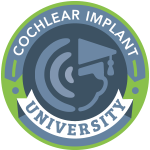Academic
Academic accommodations can help you reach your full academic potential by ensuring that you have access to all of the verbal information provided in a class.
You may not have needed any (or many) academic accommodations in high school, but the college learning environment is different (larger classrooms, more ambient noise), so you may find that you have different needs. Remember, it’s up to you to ensure that you have the academic accommodations that you need to succeed.
Here are some common accommodations used by other students with cochlear implants. You may be more familiar with some than others. For a full description of these accommodations, download the Academic Accommodations Handout
- Interpreting/transliterating services
- Speech to text services
- Priority registration
- Notetaking services
- Induction loop devices
- Audio recorders
- Testing accommodations
- Classroom accommodations
Do not be afraid to ask for accommodations you need. In certain cases, the entire class may even benefit from the accommodations. For example, asking for visual aids may mean that the entire class receives a handout that the professor prepared to accompany a lecture.
The Office of Disability Services often does not inform professors of your accommodations. Rather, you will get an official letter that outlines your accommodations to share with yours professors. You should make multiple copies of the letter so you can give a copy to each of your professors and keep a copy for yourself for future semesters.
The Resources section contains tips to notify your professor about your accommodations and steps to take if a professor doesn’t implement your accommodations.

